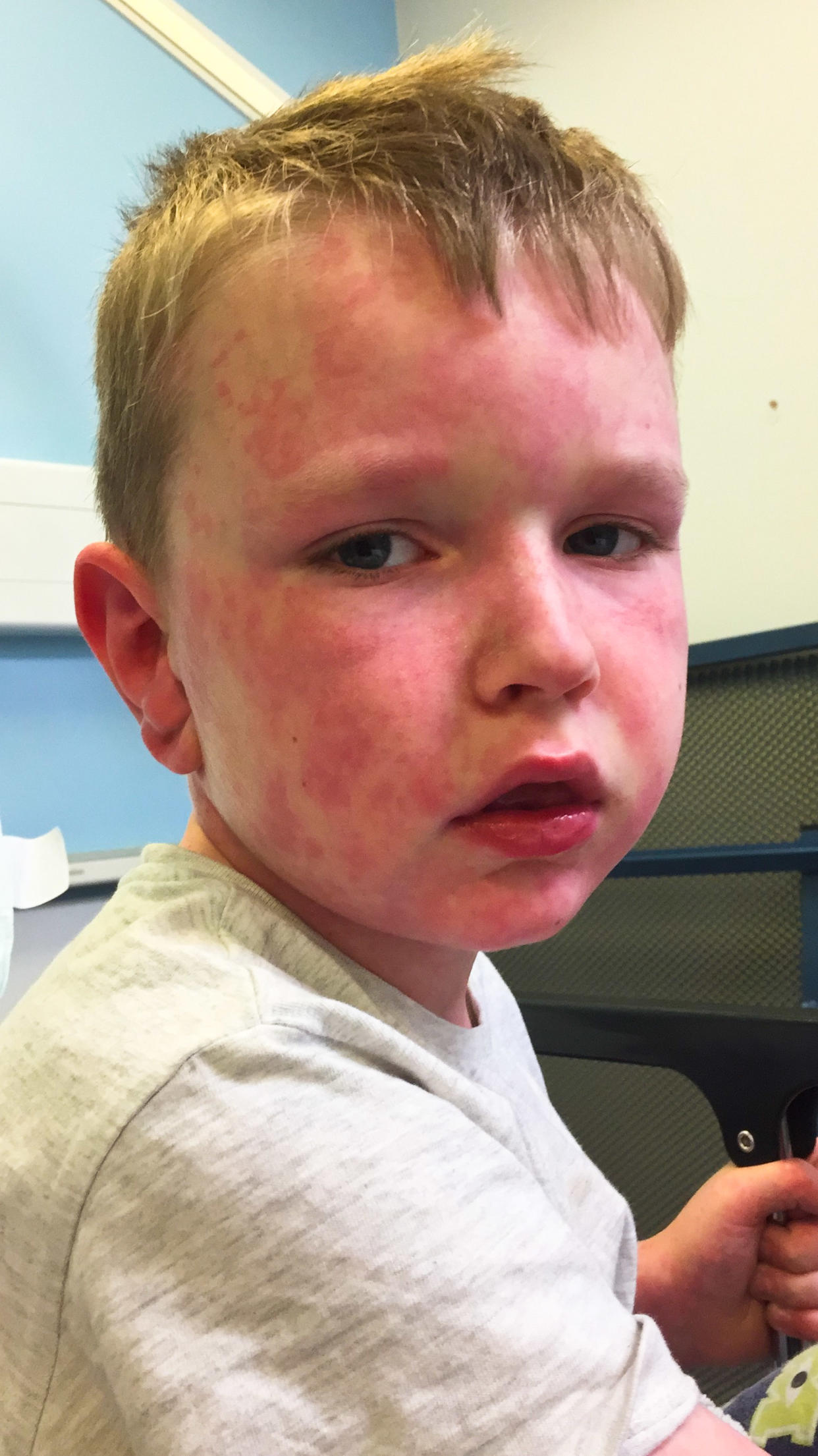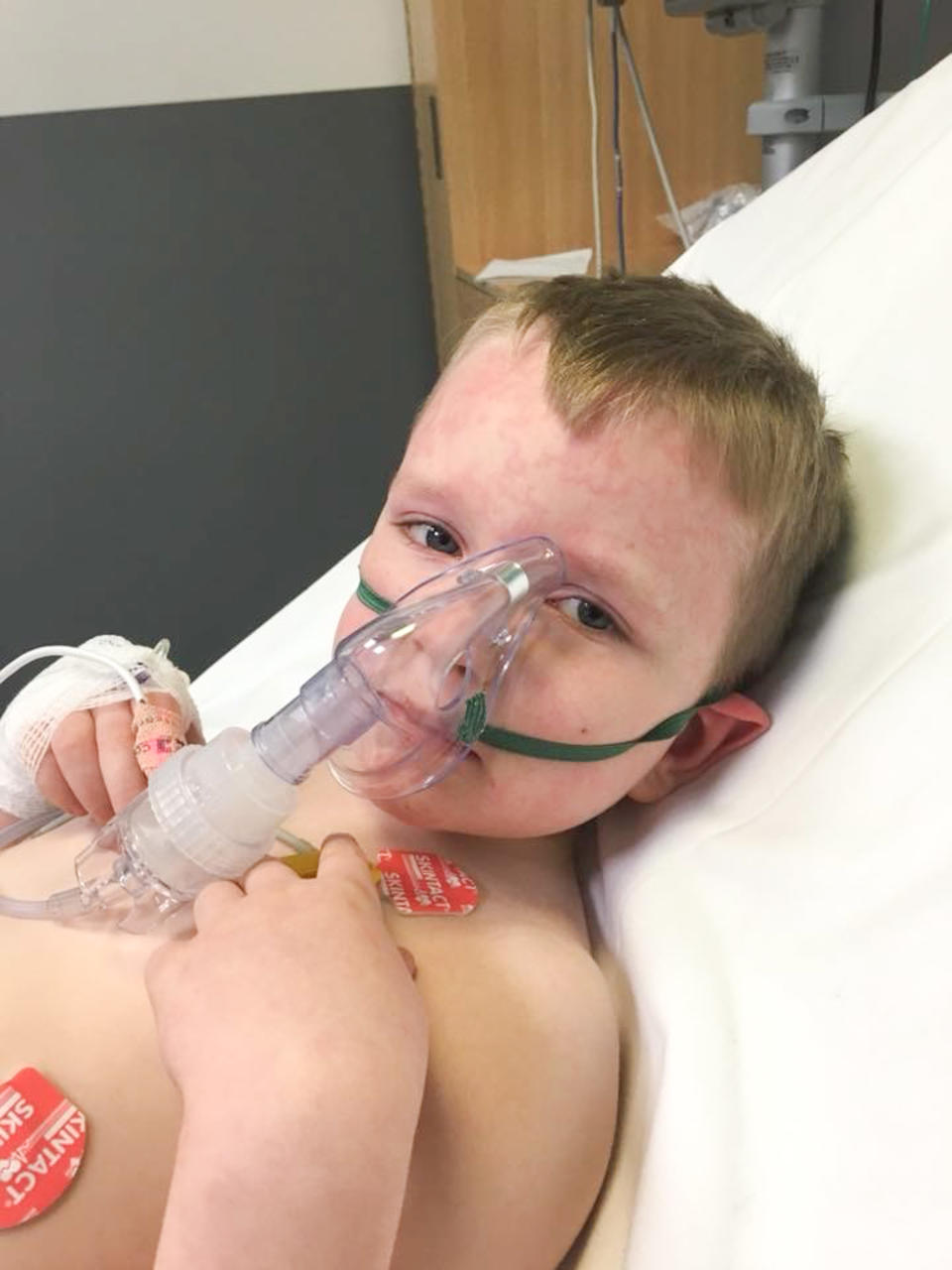Meet the seven-year-old boy who is 'allergic to winter'

A seven-year-old boy spends much of winter in hospital because he is “allergic to the cold”.
Tommy Leitch suffers from cold urticaria, which leaves him covered in hives and battling severe swelling of the lips, tongue and throat every time the temperature drops.
The youngster, from Amersham in Buckinghamshire, was hospitalised every month last winter after the icy weather left him vomiting, struggling to breathe and covered head-to-toe in a nasty rash.
Left untreated, Tommy could go into anaphylactic shock, with his swollen tongue and throat also putting him at risk of suffocating.

Speaking of her son’s condition, Abigail McDonald, 26, told Caters News: “Last winter he was hospitalised every month as his allergic reaction caused him to violently vomit, struggle to breathe and was delirious.
“It's a horrific condition and I always panic about it as it can be life threatening if Tommy doesn't get urgent medical attention.
“It is heartbreaking to witness my little boy with an oxygen mask on and with wires hanging off him in hospital but he is so brave.”
What is cold urticaria?
Cold urticaria occurs when exposure to icy temperatures, water or objects causes the body to release immune cells and histamine, which together trigger inflammation.
In as little as two minutes, a sufferer may break out on hives, start wheezing and develop a rapid, irregular heart beat. In severe cases, patients can go into shock, collapse and even die.
The condition is rare, with just 0.05% of people in New Zealand suffering, DermNet NZ statistics show. It is unclear how many patients are in the UK or US.
Sufferers are advised to avoid the cold as much as possible, and carry anti-histamine and adrenaline in case a reaction takes place.
READ MORE: Some People Are Actually Allergic to Cold Weather
Miss McDonald first became concerned when she noticed a tiny rash on Tommy’s forehead when he was just five years old.
"I thought it was just a viral infection but the next morning he was covered from head-to-toe, and complaining of stomach and chest pains with a swollen face and stomach,” she said.
“We immediately took him to the hospital. He was given anti-histamines and adrenaline, and we were referred to a dermatologist who diagnosed him with cold urticaria and angioedema.”
Angiodema describes swelling beneath the skin, most commonly in the lips, tongue and around the eyes. It usually occurs after exposure to an allergen.
The mother-of-two cannot even wrap her son up to prevent a reaction, with heat also triggering similar symptoms. This part of Tommy’s condition has not yet been diagnosed.
“As the years have gone on, we have noticed it is both hot and cold weather conditions that cause him to have a flare up,” she said.

Tommy’s condition has had an impact on the entire family, with them being too anxious to go on days.
“I am always on guard as we never know when it is going to happen which makes it even scarier,” Miss McDonald said.
“Tommy starts to worry as soon as he sees the rash, which I think makes the rash worse.
“He has missed out on lots of play dates with his friends and as a family we have been unable to go on holiday or on day trips as I am too anxious in case it happens when we are on the plane or abroad."
READ MORE: Is It a Cold or Allergies? How to Tell the Difference
Miss McDonald, a waitress, and her fiancé Ben Leitch, 32, dream of getting married abroad. But the pair worry the warm weather will trigger Tommy’s mysterious allergy, with temperatures above or below 20°C (68°F) causing him to break out in a rash.
The couple try and keep the youngster safe by ensuring he wears appropriate clothing for the season and only allowing him outside for 20 minutes at a time.
Tommy recognises when he is starting to feel unwell and immediately asks his mother for an anti-histamine. These do not always work, however, causing the youngster to vomit and end up in hospital.
READ MORE: Mum-of-two falls into three-day coma after drinking Diet Coke due to severe allergy
Miss McDonald is speaking out to raise awareness of her son’s condition.
“I had no idea people could be allergic to temperatures before Tommy, which I think makes it even more difficult,” she said.
“There aren’t any leaflets in my local GP so I have had to turn to Facebook support groups to learn more and try and find remedies on how to reduce the flare ups.”


